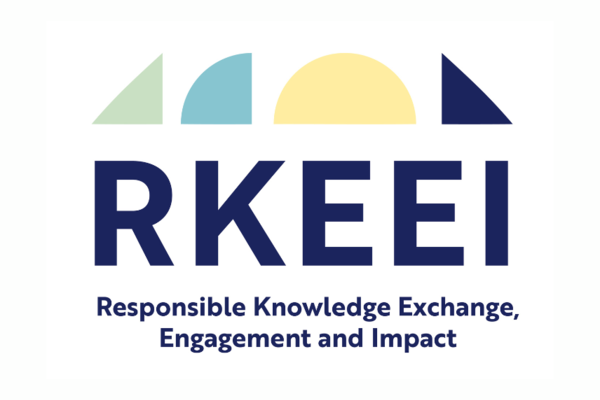Responsible Knowledge Exchange, Engagement and Impact
The Responsible Knowledge Exchange, Engagement and Impact (RKEEI) Framework
Across the UK and internationally, research is subject to increasingly principled evaluation. While standards exist for responsible research practice, equivalent evidence-informed expectations have not been articulated in relation to KEEI activities. The Responsible Knowledge Exchange, Engagement and Impact 2021-24 (RKEEI) project has undertaken research through documentary analysis, literature reviews, interviews and workshops bringing together KEEI professionals, senior leadership and researchers at all career stages to conceptualise RKEEI practice and co-create a framework to support responsible KEEI practices.
Explore RKEEI resources:
| RKEEI Framework, principles and case study films (below) |
| Download the |
| Access the step-by-step online resource (SSO required) |
| Find out more about the RKEEI project and who to contact for support (below) |
RKEEI Principles
By adopting the RKEEI Framework, researchers, professionals and their organisations commit to the following principles:
1. Integrity and Ethics
KEEI activities will be conducted with integrity and reflexivity, including appropriate scrutiny of ethical implications and responsible data management.
The application of this principle includes commitment to:
- Establishing and applying appropriate and proportionate procedures (formal and informal) to enable self-evaluation, monitoring and accountability, while avoiding excessive adminis trative burden.
- Promoting ethics and integrity in KEEI through best-practice guidance, case studies and built-in training specifically tailored for different categories of staff and students.
- Cultivating a culture of KEEI that foregrounds values of epistemic honesty, ethical safeguarding and service to society.
2. Equity, Inclusion Diversity and Belonging
KEEI will be encouraged and conducted in a manner that fosters inclusive collaboration, enables representation of diverse voices and values, ensures fairness in outcomes and the distribution of benefits.
The application of this principle includes commitment to:
- A culture of diversity and inclusion that provides different opportunities, support and career pathways for both professional staff and researchers to engage in KEEI.
- Collaborating with a range of partners and stakeholders with complementary resources and capabilities, balancing interests, contributions and benefits; respecting everyone involved; and addressing power imbalances, especially when engaging with minoritised or marginalised groups and individuals.
- Dedicating equitable commitment to KEEI and ensuring fairness in outcomes or the distribution of benefits alongside the traditional focus on research publications.
- Valuing the full diversity of KEEI activities and actors beyond the summative evaluation of REF and impact assessments – including diverse voices, perspectives, and levels of participation from different actors and stakeholders.
3. Reciprocity and Sustainability
Trusted relationships with stakeholders will be fostered through KEEI activity, cultivating meaningful, reciprocal and lasting benefits to those involved or impacted, and steps will be taken to minimise the risk of harm to people, places and the environment.
The application of this principle includes commitment to:
- Developing reciprocal and sustainable exchanges requires the development of realistic timeframes, transparent communication about resources, capacity and constraints, eco-friendly practices and looking beyond the life-cycle of the activity.
- Carefully considering the immediate and long-term benefits or changes to local communities, people, and their context and surroundings, taking into account needs and possible risks, and collaboratively seeking solutions that benefit diverse groups without disadvantaging others.
- Avoiding all and any extractive or exploitative activities e.g. where communities or individuals leave the interaction in a worse state than they entered or credit and benefit are disproportionally and inequitably distributed.
4. Contextual Sensitivity and Cultural Respect
Sincere respect will underpin all KEEI interactions, with careful attention to how the accessibility and acceptability of actions, behaviours and language may shift in different contexts, and whose interests and worldviews are being prioritised.
The application of this principle includes commitment to:
- Recognising and addressing any problematic power imbalances involved in KEEI collaborations, thinking carefully about the history of the university’s interaction with that community.
- Understanding the various drivers for stakeholders and specific projects, and the opportunities and challenges (e.g., policy constraints, conflicts of interest, reputational risks) involved.
- Practising contextual sensitivity, across different cultures and experiential contexts by integrating mechanisms of listening to or ‘reading’ contextual information, and ensuring that practices respect principles of inclusivity and cultural safety.
5. Sharing and Openness
A culture of sharing and openness in KEEI will be promoted, whilst acknowledging and negotiating issues of confidentiality, trust and differing timeframes and agenda of KEEI stakeholders.
The application of this principle includes commitment to:
- Prioritising the use of open practices for RKEEI activities and outputs whenever appropriate and ensuring that sharing is done in ways accessible to different communities.
- Negotiating the boundaries around confidentiality across commercial, political, policy, medical, legal, regulatory and ethical contexts in ways that balance fairly and reasonably the expectations of the research partners and the communities involved.
- Diversifying the pathways for engagement with a broad array of external audiences, including communication pathways typically used by the KEEI partners and their communities.
- Promoting a culture of continual shared learning within and across institutions, providing opportunities for inspiring and valuable examples for RKEEI practices.
6. Support and Recognition
KEEI will be recognised and supported as an important component of research, with acknowledgement of the time, skills and resources required and the diverse array of contributions required by KEEI’s collaborative nature.
The application of this principle includes commitment to:
- Providing training and professional development in RKEEI process protocol, communicative skills, decision-making and ethics to researchers at different career stages, students, professional staff, and university decision-makers.
- Facilitating access to KEEI mentorship opportunities and communities of practice to build shared learning opportunities across the University.
- Broadening recognition and recruitment criteria, including careful attention to how different KEEI contributions and workloads are recognised and rewarded.
- Establishing an institutional framework that facilitates networking and fosters collaboration through promoting the inclusion of diverse array of stakeholders in KEEI.
For each of the principles, the RKEEI resource currently being prepared will also include specific implications for key groups (researchers, professional staff and organisational leadership). In turn, these implications (phrased as questions) are the basis of self-assessment, reflection and planning take-away tools for each of the key groups. Development of an online training resource for researchers is also underway.
To cite the RKEEI Framework: Oancea, A., Marshall-Brown, A., Scott-Barrett, J., Cai, W., Kamphausen, L., McLeod, C., Polding, L., Watson, S. (2024) The Responsible Knowledge Exchange, Engagement and Impact (RKEEI) Framework and Principles.
Case study films
Case study 1: Responsible Impact and Sustainable Big Data Conversations
Dr Federica Lucivero is Associate Professor in the ethics of technology at the Oxford Centre for Ethics and Humanities (Ethox) and Oxford Population Health. In this video, Dr Lucivero details her research into the social and ethical values that guide and could guide innovation and research, especially in the biomedical field.
Case Study 2: Responsible Knowledge Exchange and Engaging Diverse Communities
Dr Samantha Vanderslott is Associate Professor and leads the Vaccines and Society Unit (VAS), hosted by the Oxford Vaccine Group at the University of Oxford. She is a health sociologist and Associate Professor working on topics at the intersection of health and society. In this video, Dr Vanderslott discusses responsible knowledge exchange in relation to equitable benefit and also discusses how diversity and inclusion are important in responsible KE practice.
About the RKEEI Project
The Responsible Knowledge Exchange, Engagement and Impact 2021-24 (RKEEI) project has brought together KEEI professionals and researchers in a series of workshops and interviews to conceptualise and support responsible knowledge exchange, engagement and impact practice and to co-create a resource and framework to support responsible KEEI practices. This resource has been developed through five strands of activity: strategic reviews of the literature, documentary analysis of strategic and operational university documents, interviews with research and culture change leaders (both academic and professional), co-production workshops to support the development of resources and training.
Funder Acknowledgement: Higher Education Innovation Fund, ESRC Impact Acceleration Account, Wellcome Institutional Strategic Support Fund, and the Research England Research Culture Fund.
Project Leads: Professor Alis Oancea and Aileen Marshall-Brown
Project Postdoctoral Researcher: Dr Juliet Scott-Barrett
Previous Research Assistants: W. Cai , L. Kamphausen, C. Macleod, L. Polding, and S. Watson.
For an early introduction of the framework, see our article on the LSE Impact Blog: https://blogs.lse.ac.uk/impactofsocialsciences/2023/05/03/what-is-responsible-knowledge-exchange-engagement-and-impact/
Who can help me?
The Social Sciences Division's Research, Impact and Engagement (RIE) team works with colleagues across Oxford’s Research Services and Academic Divisions, as well as with the Gardens, Libraries and Museums (GLAM), to ensure that Social Sciences researchers have as many opportunities as possible to develop their responsible knowledge exchange, engagement and impact activities. Contact one of the specialist team members below for advice on the best next steps for your ideas:





